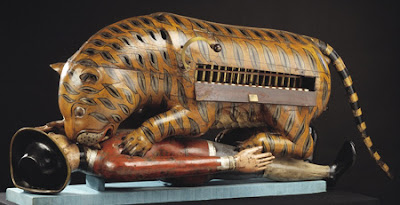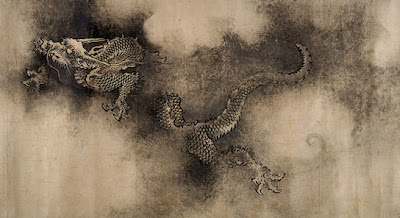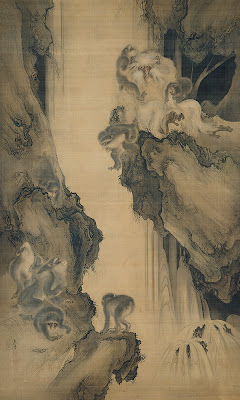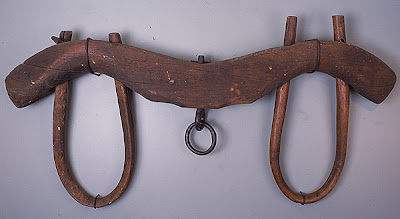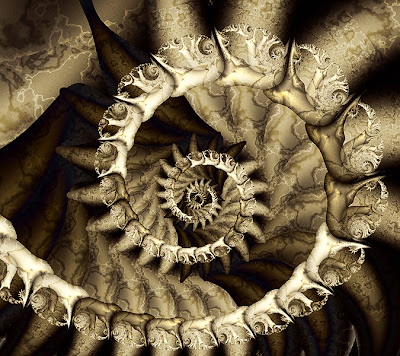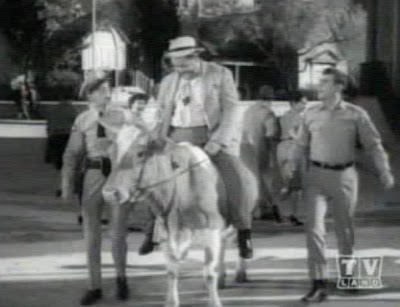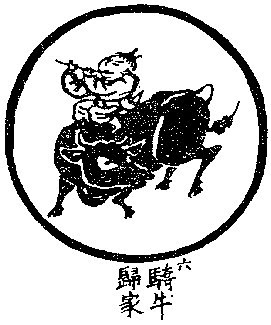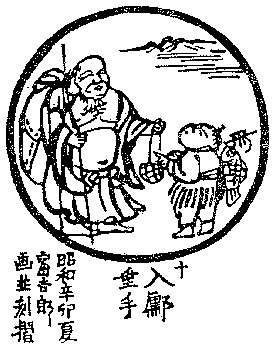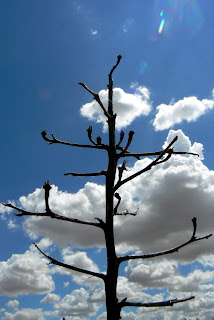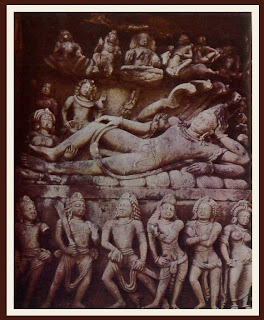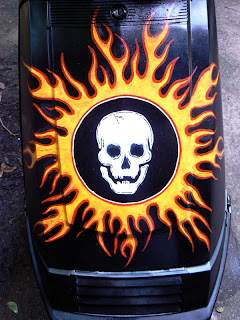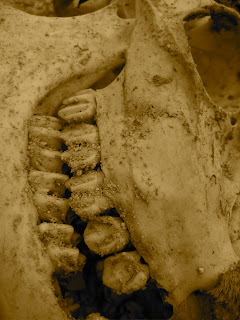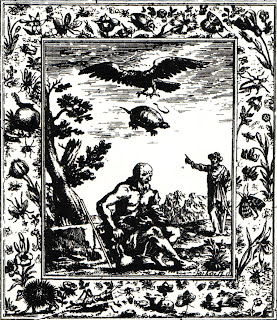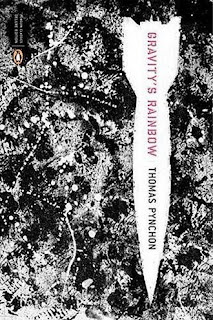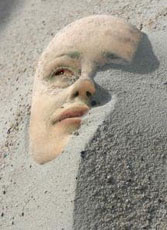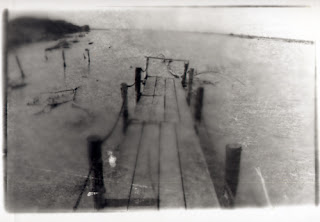
The Donkey:
http://laughingbone.blogspot.com/2005/02/mechanics-of-laughter.html
I once read that the Greek Philosopher, Chrysippus, died from laughter after he saw a donkey eating some figs. That seemed strange to me until I imagined the scene. To this day, I find donkeys almost unbearably amusing, especially if they are eating. I can't explain it. Something about the donkey's mouth and teeth and the simple donkeyness of it all.
From Balaam's Donkey: The Tale as Rendered by the Rev. B. Jones:
There once was a whiskey-priest name of Balaam. Used to ride around on a Donkey. Get drunk, pass out on the donkey, wake up in an another town. Not a bad life for Balaam.
Come a time when Balaam stumble into a difficult place called Moab and meet up with a local boss name of Balak. Boss Balak told Balaam that he’d give him some silver if he cursed the next town over, place called Godspeople. Balaam thought about it for about a second, asked for another bottle of whiskey, and said no problem. Who cares about the curses of a goddamned whiskey-priest?
On the way to Godspeople, Balaam’s Donkey come upon a Fiery Angel Of God Swinging a Bloody Sword and stopped in the middle of the road, wouldn’t budge. Balaam was too drunk to see anything and started beating the Donkey until they both fell down into the dust of the road.
It was then that they Donkey whispered into Balaam’s ear: Lookout, there’s a Fiery Angel of God with a Bloody Sword coming over to whoop your own ass.
God, I must be drunk, said Balaam as he sat up. But it was then that he too saw the Angel and the Sword. He passed out cold right there. But the Donkey listened to what the Angel had to say. And, most importantly, understood.
To this day, it is said by some that donkey’s can talk, but they choose only to laugh their hee-haw because of what the Angel told them.
❂
The Tiger:
Tiger! Tiger! burning bright
In the forests of the night,
What immortal hand or eye
Could frame thy fearful symmetry?
In what distant deeps or skies
Burnt the fire of thine eyes?
On what wings dare he aspire?
What the hand dare seize the fire?
And what shoulder, and what art,
Could twist the sinews of thy heart?
And when thy heart began to beat,
What dread hand? and what dread feet?
What the hammer? what the chain?
In what furnace was thy brain?
What the anvil? what dread grasp
Dare its deadly terrors clasp?
When the stars threw down their spears,
And watered heaven with their tears,
Did he smile his work to see?
Did he who made the Lamb make thee?
Tiger! Tiger! burning bright
In the forests of the night,
What immortal hand or eye
Dare frame thy fearful symmetry?
- Blake
☷
☷
A tiger comes to mind. The twilight here
Exalts the vast and busy Library
And seems to set the bookshelves back in gloom;
Innocent, ruthless, bloodstained, sleek
It wanders through its forest and its day
Printing a track along the muddy banks
Of sluggish streams whose names it does not know
(In its world there are no names or past
Or time to come, only the vivid now)
And makes its way across wild distances
Sniffing the braided labyrinth of smells
And in the wind picking the smell of dawn
And tantalizing scent of grazing deer;
Among the bamboo's slanting stripes I glimpse
The tiger's stripes and sense the bony frame
Under the splendid, quivering cover of skin.
Curving oceans and the planet's wastes keep us
Apart in vain; from here in a house far off
In South America I dream of you,
Track you, O tiger of the Ganges' banks.
It strikes me now as evening fills my soul
That the tiger addressed in my poem
Is a shadowy beast, a tiger of symbols
And scraps picked up at random out of books,
A string of labored tropes that have no life,
And not the fated tiger, the deadly jewel
That under sun or stars or changing moon
Goes on in Bengal or Sumatra fulfilling
Its rounds of love and indolence and death.
To the tiger of symbols I hold opposed
The one that's real, the one whose blood runs hot
As it cuts down a herd of buffaloes,
And that today, this August third, nineteen
Fifty-nine, throws its shadow on the grass;
But by the act of giving it a name,
By trying to fix the limits of its world,
It becomes a fiction not a living beast,
Not a tiger out roaming the wilds of earth.
We'll hunt for a third tiger now, but like
The others this one too will be a form
Of what I dream, a structure of words, and not
The flesh and one tiger that beyond all myths
Paces the earth. I know these things quite well,
Yet nonetheless some force keeps driving me
In this vague, unreasonable, and ancient quest,
And I go on pursuing through the hours
Another tiger, the beast not found in verse.
- Borges
From Emblem, Prisoner and Fiction: The Tiger in Western Literature by Ruth Padel:To the American poet Wallace Stevens (1879–1955), imagination was “the power that enables us to perceive the normal in the abnormal, the opposite of chaos in chaos.” His poem “Disillusionment of Ten O’Clock” (1923) pictures conventional people at home at the end of their day, pressured to be like everyone else. Even in dreams they are caged, not free. They do not “dream of baboons and periwinkles.” Out on the street, however, an old sailor, “Drunk and asleep in his boots,” conjures up in his stupor the exotic dreams he once had in far-off places. In his alcoholic haze, he “Catches tigers / In red weather.”
That “red” could mean many things, but it certainly suggests the power of imagination. Unlike the people caged in their houses, and in boring “white night-gowns,” the tramp-like sailor is colored and enriched; saved, by dreaming of tigers, from the caging “disillusionment” of modern living. Catching tigers in red weather is an image for imagination and dream.
❂
The Dragon:
The ant's a centaur in his dragon world.
- Pound
http://bonecarver.blogspot.com/2007/10/on-being-difficult-wind-through-skull.html
Concerning the relationship of the Donkey and the Tiger to the Dragon: the Donkey and the Tiger are derivatives of the Dragon and have no knowledge of the Dragon. The Dragon represents the Abyss out of which all we know had been formed. Gnostic connotations here. Pre-socratic. Primal Myths. Upanishads. Revelations.
And I saw an angel come down from heaven, having the key of the Abyss… And he laid hold on the dragon, that old serpent, which is the Devil, and Satan, and bound him a thousand years, And cast him into the Abyss, and shut him up, and set a seal upon him, that he should deceive the nations no more, till the thousand years should be fulfilled.
- Rev.20:1,2, AMP
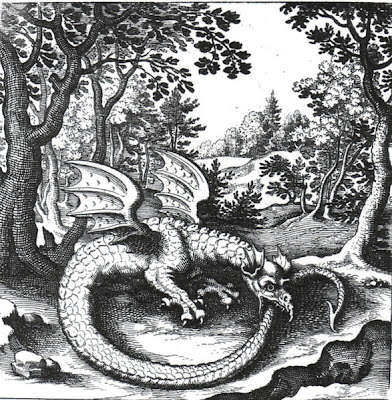 Lucas Jennis' engraving published on an alchemical emblem-book
Lucas Jennis' engraving published on an alchemical emblem-bookentitled De Lapide Philisophico (1625)
From http://faculty.vassar.edu/brvannor/heidegger.html:
Finally, we would like to explore very briefly a few of the most promising connections that might obtain between Heidegger and the Taoists, Chuang-tzu and Lao-tzu. Otto Pöggeler's essay, though it often wanders well off the subject, offers the most substantial textual support for the various possible influences and analogies.cf. From Taoism and the Arts of China by Thomas Christensen
In chapter 17 of the Chuang-tzu Hui Shih puts forward a challenge: "You are not a fish. Whence do you know that the fish are happy?" Chuang-tzu replies, famously, "You aren't me, whence do you know that I don't know the fish are happy?" [Chuang-tzu: The Inner Chapters, A. C. Graham, ed. and trans. (Boston: Unwin Paperbacks, 1986), 123.]
Heidegger is known to have been fond of this passage and to have read aloud from it in 1930 during a discussion of intersubjectivity and empathy (Pöggeler, 52). It is easier to see what divides Heidegger and Chuang-tzu than what unites them, however, since, as Pöggeler says, the moral of the story has to do with "the universal sympathy which joins together all the things of nature -- such as men and fishes" (53). For Heidegger, on the contrary, other living creatures are "separated from our ek-sistent essence by an abyss." [Heidegger, "Letter on Humanism," in Basic Writings, D. F. Krell (New York: Harper & Row, 1977), 206.]
Or consider chapter 11 of the Lao-tzu:
Clay is molded to make a pot
In its emptiness [lit., nothing]
Is the usefulness of the pot.
[Cf. Pöggeler, 61, and Parkes, 120-121. Translations from the Tao Te Ching are by Bryan Van Norden.]
In what might appear to be a strikingly analogous passage, Heidegger describes a jug as a paradigmatic "thing," that is, an artifact that holds human practices together and makes them intelligible. He writes:
When we fill the jug, the pouring that fills it flows into the empty jug. The emptiness, the void, is what does the vessel's holding. The empty space, this nothing of the jug, is what the jug is as the holding vessel. ... But if the holding is done by the jug's void, then the potter who forms sides and bottom on his wheel does not, strictly speaking, make the jug. He only shapes the clay. No -- he shapes the void. ... The vessel's thingness does not lie at all in the material of which it consists, but in the void that holds. [Heidegger, "The Thing," in Poetry, Language, Thought, A. Hofstadter, trans. (New York: Harper & Row, 1971), 169.]
The tiger and dragon are often found as a paired motif in Taoist iconography. "In addition to symbolizing yin and yang, the tiger and dragon also symbolize west and east, and the elements (or phases) fire and metal. In Taoist chemical alchemy (waidan, or "outer" alchemy), the tiger and dragon also represent two of the most powerful elixir ingredients known, lead and mercury, while in the Inner Alchemy (neidan) tradition, the two animals symbolize yin and yang as they are brought together in the inner (human) body through visualization and transformed to create a divine embryonic form of the practitioner" (Stephen Little).The Monkey:
http://laughingbone.blogspot.com/search?q=monkey
From http://www.laughingbone.com/ashipadrift:
"With the Fall of Man,
the image of God in him is darkened."
-The Eros of Repentance
The Bones of Man and
The Wreck of the Ship.
There washed up on the Beach,
Ragged with weeds
And torn sails,
The tide red and churning pink.
The Monkey and the Man Collecting Bones
For tools, for dignity and,
most of all,
For Memory.
Sitting with the Mermaid’s
Wooden stare and
The Skin of a Tattooed Mariner.
Blue Flames and
South Sea Mysteries.
A Ship adrift
And spinning...
Through the Skull of God.
Since we last spoke, the monkey of little "w" work covered in blood and shit wailing around the room of my mind, breaking everything, fucking every hole, masturbating the monkey cock every second, a constant stream of ink-like diarrhea oozing out of its ass writing the meaningless story of the days everywhere, blotting out blankness with its same as it ever was doing over and over obliterating monkey robot insane slavery shit blackness.
Finally, about a month ago, get the little fuck back into the cage in the corner and calmed down with the food pellet hook-up to the pleasure center press the lever loop.
Get my mind returned to winter beach Emptiness, spread eagle in the surf, turning like a star. The master of my imagination down there in some deep coral cave like Blake's Newton with his compass and his square, reckoning the figure of God's face upon the waters.
Went back down to Mexico to ease the flesh around my bones, watch the stars plough furrows across the night sky, drink from the endless bottle of tequila. Maricela, Dulce, Alma, Rojo, Muertos and Calaveras. Figure that I am not too much longer for this world. Got a hole in my bucket and all the alcohol in the world isn't enough to keep it from getting closer to empty every day.
While walking hungover through the worn out pussy pink, sweat soaked stink of a Matamoros dawn: where the little monster fuck monkey was released. Not for the Old Man but for the genetic ghost that haunts my bones. William James' nightmare of the green idiot boy and the slobbery whisper of the drunk into your ear: that shape you are potentially.
❂
The Whale:
http://laughingbone.blogspot.com/search?q=whale
I grin at thee, thou grinning whale! Look ye, sun, moon, and stars! I call ye assassins of as good a fellow as ever spouted up his ghost. For all that, I would yet ring glasses with thee, would ye but hand the cup!
- Ahab
❂
❂
The Dog:
http://laughingbone.blogspot.com/2005/02/god-is-haunting-me-with-his-damn-skull.html
http://laughingbone.blogspot.com/2004/07/dog-at-temple-gate_108997349210721852.html
http://www.laughingbone.com/scrimshaw%3Ast.john%27sdog
Near the center of the grove, I turned and the stray was suddenly there. Standing on the border of the shadow and the sunlight. A strange thought danced through my head as we watched each other: it was of his concern for me, seeming to say: I only wanted to make sure you got through the storm.
I stared at the dog a long time and made a half-hearted gesture of raising my hand in acknowledgement. At least there is this, I said quietly, as if it were part of a prayer.
The Ox:
http://www.laughingbone.com/theox-herdingseries
http://www.laughingbone.com-a.googlepages.com/bonecarver%3Adistantbell
- Some goddamned fool has let the Ox loose again.
The Ox. Loose. A goddamned fool. I was struck silent.
He steered the boat across the water and into the seclusion of the inlet that was once a Mill Pond before the Damm was built. Cutting the motor, we drifted up to the decaying dock. Scattered portions of a broken waterwheel. I tied us onto a mossy post.
The bell rang again. Not far off.
- Go on. See if you can find the thing and stay with him till I get back from the Boathouse. We’re going to need some help to get it back around the Lake.
I got out. For some reason, he handed me the stringer of fish we had caught earlier.
I held it up and back towards him. He waved me off.
- Don’t know. Maybe you can lure him to you with those fish.
He pushed back through the lilly pads and started the motor back up. I just stood there. He said something I couldn’t hear.
- What?
- Careful with those fish.
The fish pulsed on the stringer, twisting gracefully.
The bell rang again. Seemed closer.
I walked off the dock and around to the front of the Old Mill. The bell again. To the right. Off the path. In the woods. I walked towards it, holding the fish high.
After a while, I reckoned the Ox was just playing with me. Whenever I would be ready to give up, I’d hear that bell again. Never did see it. No other sound but that bell.
The fish were getting heavy. And I wondered why I was walking around in the woods trying to find the goddamned Ox in the first place. What good could I do? I decided to head back to the Mill and wait for my Grandfather.
I turned back and walked a ways. Then stopped. I was lost. Lost. Dammit. I sat down on a fallen tree. The bell again. I didn’t move. Then again. Closer.
I turned and there it was. The Ox. About twenty yards across a clearing. Staring at me like he was wondering why I stopped. I shrugged, held up the stringer of fish. Turned back to consider my predicament.
The Ox ambled closer. I kept my back to him. Wondering how close he might come and what I was going to do if he came too close.
He blew air onto my back. I jumped up, turning, dropping the fish. He was enormous. Kind of awful. I froze. He pushed around the tree, cracking branches, to come around to my side. Around his neck, the bell, softly sounding.
The Old Man:
From The Eros of Repentance:
To walk this way means to lift up the cross of repentance. The Old Man does not give way without violence. And the devil is not conquered without hard warfare.
This is inextricably associated for me with this bit from an interview with C. McCarthy:
There's no such thing as life without bloodshed. I think the notion that the species can be improved in some way, that everyone could live in harmony, is a really dangerous idea. Those who are afflicted with this notion are the first ones to give up their souls, their freedom. Your desire that it be that way will enslave you and make your life vacuous.
From The Eros of Repentance:
A God who does not deify man; such a god can have no interest for us, whether He exists or not.
In order for the believer to be joined to Christ and made alive, he must first die to the old man by means of repentance. One must crucify and bury the old man, (that is, egoism, the passions, and the selfish will,) at the cross and tomb of Christ, in order top rise up with Him and walk in 'newness of life'. This is the work of repentance and the carrying of the cross of Christ. Without repentance, the continual crucifying of the old man, the believer is incapable of believing evangelically.
See also: http://esotericteaching.org/articles/parable_of_the_mountain_path.pdf
Enough. The Old Man took me out of the Zoological into the Anthopomorphs / Imagos: Old Man, Gatekeeper, Bonecarver, Bonecharmer, Holy Fool, etc. - which is a can of worms to be opened at another time.
❂
